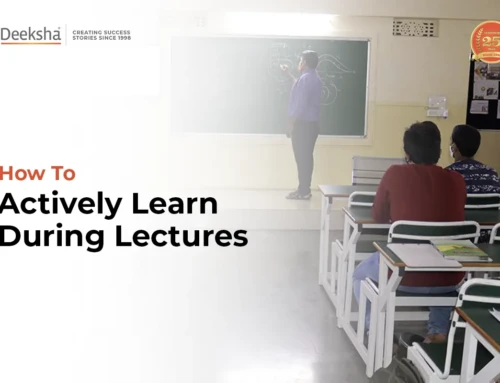Overview
Students worry about CBSE Class 10 and 12 board examinations. This article examines the science underlying test anxiety, including poor preparation, low self-confidence, and the fight-or-flight reaction. The article outlines five main tips to help students prepare better for the CBSE board exams, including avoiding negative self-talk, maintaining a healthy sleep schedule, being well-prepared, avoiding being too hard on yourself, and learning to prioritise. Additionally, the article provides quick advice for students before entering the exam hall to reduce anxiety and increase confidence.
Why Do Students Fear CBSE Class 10 & 12 Board Exam: The Science Behind It?
Preparing for the 10th board exams can be a stressful time for students. It is vital to plan a study schedule and stick to it, to reduce stress, i. Taking short breaks between study sessions, staying organised, and avoiding distractions can also help. Additionally, staying hydrated, eating healthy foods, getting enough sleep, and exercising can help reduce stress and improve overall well-being. Taking care of mental and physical health during exam time is essential to perform your best.
By following these tips, students can reduce stress and feel more confident in their preparation for the 10th board exams. Remember, staying focused and prioritising self-care during this time is important.
As the CBSE board Class 10 and 12 examinations approach, students often experience high perplexity and stress due to the fear associated with these exams. The science behind this fear can be attributed to several factors, including incomplete preparation, low self-confidence, and the fight or flight response.
-
Incomplete Preparation
A lack of preparedness sometimes brings on students’ anxiousness. Students often experience
anxiety and concern about their test performance when they have not fully explored all subjects or lack confidence in their understanding of a subject. This unpredictability may raise stress levels, which can, therefore, negatively impact productivity.
Challenges with time management and procrastination lead to inadequate preparation. This may make it even more challenging to concentrate on studying and preparing for the examinations since it might trigger fear and self-doubt.
-
Low Self-Confidence
Students’ low confidence also affects their anxiety over the CBSE board examinations. Students who don’t believe in themselves may struggle with anxiety because they mistrust their talents and worry about how they seem to others. The problem might become much worse if these uncertainties trigger negative internal dialogue.
Many students who lack self-confidence suffer from repetitive negative thoughts. Students’ self-doubt and worry might grow when they engage in negative self-talk by dwelling on their perceived flaws. Students who have had academic challenges in the past may find this especially difficult since they may have established negative ideas about their academic ability.
-
Fight or Flight Response
The instinctual reaction of fight or flight is a bodily response triggered by the perception of a potential hazard or peril. In the face of the daunting CBSE board exams, students may experience a physiological reaction wherein their bodies may activate the instinctual fight or flight response. The reaction to this statement may result in bodily manifestations such as heightened stress and intensifying sensations of unease and tension.
The Five Main Tips to Help You Prepare Better in CBSE Board Exams
1. Do Not Indulge in Negative Self-Talk
The impact of unfavourable negative self-talk on a student’s drive and academic achievements cannot be overstated. When students harbour negative thoughts about themselves, they tend to fixate on their limitations. This feeling of insufficiency and unease among students may undermine their confidence. So, rather than focusing on the negative, it would be beneficial for students to nurture a constructive point of view and celebrate their unique qualities.
To achieve this goal, it is of utmost significance for students to assess their achievements and the favourable attributes of their personalities. One may reflect upon their dedication to their endeavours and the milestones they have successfully attained thus far. Positive self-talk, such as “I possess the ability,” “My potential is limitless,” and “I am committed to giving my best,” serve as potent instruments in strengthening self-assurance. Another way to eliminate negativity and foster a positive outlook is to surround yourself with supportive and motivating peers.
2. Take Care of Your Sleep Schedule
Sufficient sleep is of utmost significance for the wellness of the body and mind, especially during your exams. It is highly recommended that students strive to attain a minimum of seven to eight hours of sleep every night to rejuvenate and concentrate better. Insufficient rest may result in reduced cognitive abilities, impaired memory, and heightened stress levels. Sustaining a regular sleep routine is essential to achieve optimal rest.
Students should establish a consistent and structured sleep regimen to enhance the quality of their sleep. Consistency in the sleep schedule is key, as it entails adhering to a fixed bedtime and morning routine, even during weekends. It is highly recommended that students create a serene sleep setting by verifying that their study areas are dimly lit, noiseless, and set at a cosy temperature.
3. Be Well-prepared
Being well-prepared for exams is key to reducing anxiety and increasing confidence. Students should create a study schedule that allows for adequate time to cover the curriculum and break down curriculum into smaller sections. Students can also benefit from using various study techniques, such as flashcards, notes, or quizzes, to test their knowledge.
To create an effective study plan, students should start by identifying the topics they must cover. Then, they should allocate specific times to study each topic. It’s essential to give more time to challenging topics and subjects. Students should also prioritise their studies based on the importance of each topic or subject.
Students can also use online resources such as study groups, videos, and previous years’ question papers to help their preparation. Mock tests and practice exams can also help you understand what to expect on exam day.
4. Don’t be too Harsh on Yourself
It helps students maintain a positive outlook regarding their abilities and avoid being overly critical during the exam period. Establish attainable objectives and prepare for your exams with a constructive mindset.
Engage yourself in leisure activities like sports, watching movies, or socialising with loved ones. Furthermore, asking for help from teachers, colleagues, or guardians during preparation can reduce stress.
5. Learn to Prioritise
With so many subjects and topics to cover, it can be overwhelming to know where to begin. Learning to prioritise can help students make the most of their study time and feel more in control.
One effective way to prioritise is by focusing on the subjects or topics that need the most attention. For instance, if students struggle with Math, they can allocate more time to practising Math problems or seek help from a tutor.
Another way to prioritise is by studying the most important topics first. CBSE board exams are known for asking questions that require a thorough understanding of fundamental concepts. Students can build a strong foundation for more complex topics by studying these concepts first.
Quick Tips Before Entering the Exam Hall
Here are some quick tips to keep in mind before entering the exam hall:
-
Prioritise a Restful Night’s Sleep Before the Exam
Adequate rest is crucial for achieving mental clarity and concentration. It is highly recommended that you prioritise obtaining a sufficient amount of restful sleep, ideally between 7 to 8 hours, before the day of your examination.
-
Indulge in a Nutritious Morning Meal
Nourishing your body with a wholesome breakfast can increase your concentration, which is imperative for acing the exam. Eat a breakfast that is both wholesome and light while avoiding any meals that are excessively greasy or oily. A nutritious meal is essential before 10th board exams because it provides the energy and nutrients necessary for optimal brain function. A balanced meal that includes protein, carbohydrates, and healthy fats can help regulate blood sugar levels, reducing the risk of crashes in energy levels that can occur with high-sugar or high-fat meals.
- Please ensure to follow the exam guidelines with utmost attention and diligence. Before writing your paper, please consider reading the guidelines and familiarising yourself with them and what is being asked.
- Optimise the use of your resources to maximise productivity and efficiency and manage your time effectively. Allocate your time judiciously across the various segments of the question paper and adhere to the designated time frame for each section. By following this approach, you can guarantee that you will have ample time to solve every question.
- There is no need to stress if you encounter a question you are unsure about. Proceed to the next question and return to this question after some time when you have some time before the exam gets over.
Conclusion
The CBSE Class, 10 board examinations, are an important turning point in students’ academic journey. It is possible for students to feel uneasy as a result of inadequate preparedness, diminished self-confidence, and the instinctual reaction of fight or flight. Learners can aptly equip themselves for success and achieve optimal performance by implementing a constructive outlook, strategic scheduling, and prioritisation of both physical and mental well-being.
By implementing these recommendations outlined in this blog, students have the ability to elevate their self-confidence, reduce their doubts, and enhance their chances of scoring excellent marks in the CBSE Class 10 board exams. With the help of these tips, students can ensure they do well in their exams and excel with greater success.








Get Social